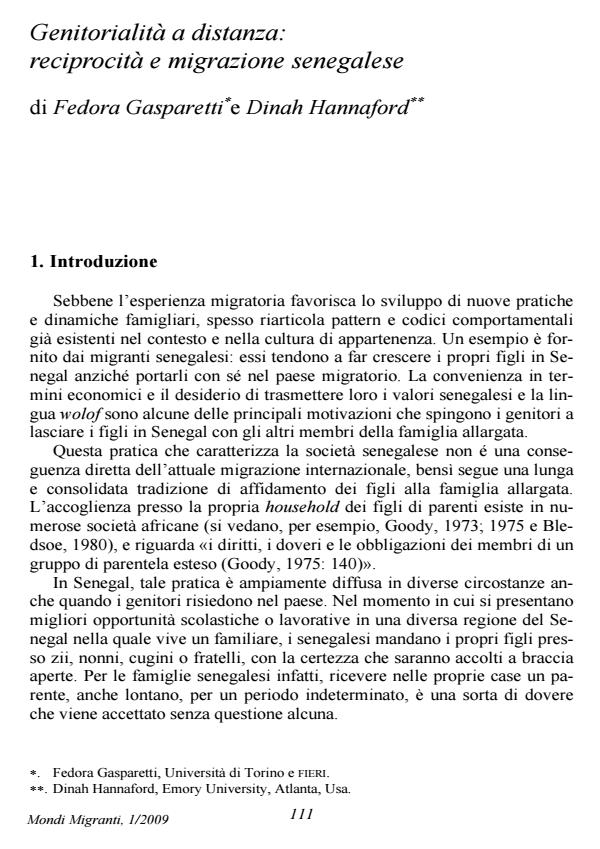Genitorialità a distanza: reciprocità e migrazione senegalese
Titolo Rivista MONDI MIGRANTI
Autori/Curatori Gasparetti Fedora, Dinah Hannaford
Anno di pubblicazione 2009 Fascicolo 2009/1
Lingua Italiano Numero pagine 21 P. 111-131 Dimensione file 200 KB
DOI 10.3280/MM2009-001006
Il DOI è il codice a barre della proprietà intellettuale: per saperne di più
clicca qui
Qui sotto puoi vedere in anteprima la prima pagina di questo articolo.
Se questo articolo ti interessa, lo puoi acquistare (e scaricare in formato pdf) seguendo le facili indicazioni per acquistare il download credit. Acquista Download Credits per scaricare questo Articolo in formato PDF

FrancoAngeli è membro della Publishers International Linking Association, Inc (PILA), associazione indipendente e non profit per facilitare (attraverso i servizi tecnologici implementati da CrossRef.org) l’accesso degli studiosi ai contenuti digitali nelle pubblicazioni professionali e scientifiche.
Genitorialità a distanza: reciprocità e migrazione senegalese - Though the migratory experience offers opportunities for new kinds of practices, traditions, and family dynamics to develop, it also often replicates patterns and codes of behavior that already exist in the mi-grant’s home culture. Senegalese migrants residing in Italy, as in other parts of the diaspora, tend to send their children to be raised by relatives in Senegal. Their motives are various and sundry: some cite the economic benefits, others the desire for the inculcation of Sene-galese values and Wolof language, still others the reluctance to have their children grow up "spoiled" as they view Italian children. For these reasons and others, Senegalese parents rarely raise their chil-dren in Italy, opting instead to leave them behind with relatives in Senegal. Yet this practice among Senegalese parents long predates contemporary Senegalese migration to Europe. Instead it follows a longstanding custom of receiving young family members into the home that draws on the fundamental Senegalese value of teranga, of-ten translated inadequately as hospitality. Teranga turns on the idea that the mother who hosts a visitor ensures that her children will find help and welcome whenever they need it. Senegalese families are duty-bound to accept even distant relatives into their homes for short, long and undetermined periods of time without question. When em-ployment or scholastic opportunities are presumed to be better in a different part of Senegal in which a relative resides, Senegalese need not think twice about presenting themselves to those relatives with full assurance of being offered a place to stay. In the migrant context, this kind of teranga works both ways. Though migrants abroad must be ready to receive their relatives in the host country at a moment’s notice, they may also send home their children to be reared without fear of imposition. Thus the concept of parent-ing from afar and children "left behind" among the Senegalese is by no means an outgrowth of contemporary migratory practices. Instead it reflects a core Senegal-ese value and extends a practice that long predates Senegal’s migratory history. This paper will highlight how care arrangements for children are organized in this particular Senegalese context of teranga, and how children of migrants experience the separation from their parents.
Keywords family dynamics, second generations, tradition, socialization processes
- West African Migrations to Italy: An Anthropological Analysis of Ghanaian and Senegalese Politics of Mobility in Emilia Romagna Selenia Marabello, Bruno Riccio, in Revue européenne des migrations internationales /2018 pp.127
DOI: 10.4000/remi.10193 - Technologies of the spouse: intimate surveillance in Senegalese transnational marriages DINAH HANNAFORD, in Global Networks /2015 pp.43
DOI: 10.1111/glob.12045
Gasparetti Fedora, Dinah Hannaford, Genitorialità a distanza: reciprocità e migrazione senegalese in "MONDI MIGRANTI" 1/2009, pp 111-131, DOI: 10.3280/MM2009-001006